- Clone
- D8B7 (See other available formats)
- Regulatory Status
- RUO
- Other Names
- Spectrin alpha chain, brain, alpha-II spectrin, fodrin alpha chain, spectrin, non-erythroid alpha chain, EL2, SPTA1
- Isotype
- Mouse IgG2b, κ
- Ave. Rating
- Submit a Review
- Product Citations
- publications
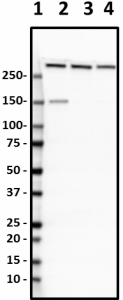
-

Western blot of Biotin anti-Alpha-II-Spectrin antibody (clone D8B7). Lane 1: Molecular weight marker; Lane 2: 20 µg of human brain membrane lysate; Lane 3: 20 µg of mouse brain membrane lysate; Lane 4: 20 µg of rat brain membrane lysate. The blot was incubated with 1 µg/mL of the primary antibody overnight at 4°C, followed by incubation with HRP-labeled streptavidin (Cat. No. 405210). Enhanced chemiluminescence was used as the detection system. The lower band in lane 2 is spectrin breakdown product (SBDP). -

IHC staining of Biotin anti-Alpha-II-Spectrin antibody (clone D8B7) on formalin-fixed paraffin-embedded human brain tissue. Following antigen retrieval using Sodium Citrate H.I.E.R., the tissue was incubated with 5 µg/ml of the primary antibody overnight at 4°C, followed by incubation with Alexa Fluor® 647 streptavidin (Cat. No. 405237) for one hour at room temperature. Nuclei were counterstained with DAPI. The image was captured with a 40X objective. Scale bar: 50 µm -

IHC staining of Biotin anti-Alpha-II-Spectrin antibody (clone D8B7) on formalin-fixed paraffin-embedded mouse cerebellum tissue. Following antigen retrieval using Sodium Citrate H.I.E.R., the tissue was incubated with 5 µg/ml of the primary antibody overnight at 4°C, followed by incubation with Alexa Fluor® 647 streptavidin (Cat. No. 405237) for one hour at room temperature. Nuclei were counterstained with DAPI. The image was captured with a 40X objective. Scale bar: 50 µm -

IHC staining of Biotin anti-Alpha-II-Spectrin antibody (clone D8B7) on formalin-fixed paraffin-embedded rat cerebellum tissue. Following antigen retrieval using Sodium Citrate H.I.E.R., the tissue was incubated with 5 µg/ml of the primary antibody overnight at 4°C, followed by incubation with Alexa Fluor® 647 streptavidin (Cat No. 405237) for one hour at room temperature. Nuclei were counterstained with DAPI. The image was captured with a 40X objective. Scale bar: 50 µm
| Cat # | Size | Price | Quantity Check Availability | Save | ||
|---|---|---|---|---|---|---|
| 803209 | 25 µg | 109€ | ||||
| 803210 | 100 µg | 249€ | ||||
The spectrins are a family of widely distributed cytoskeletal proteins which are involved in actin crosslinking. Spectrin α-chain heterodimerizes with tissue-specific β-chains. It is specifically expressed in nonerythrocytic cells. The protein has been implicated in other cellular functions including DNA repair and cell cycle regulation. Mutations in the gene are the cause of early infantile epileptic encephalopathy. Fodrin, a spectrin that seems to be involved in secretion, interacts with calmodulin in a calcium-dependent manner and is thus a candidate for the calcium-dependent movement of the cytoskeleton at the membrane.
Product DetailsProduct Details
- Verified Reactivity
- Human, Mouse, Rat, Drosophila
- Antibody Type
- Monoclonal
- Host Species
- Mouse
- Formulation
- Phosphate-buffered solution, pH 7.2, containing 0.09% sodium azide.
- Preparation
- The antibody was purified by affinity chromatography and conjugated with biotin under optimal conditions.
- Concentration
- 0.5 mg/ml
- Storage & Handling
- The antibody solution should be stored undiluted between 2°C and 8°C. Do not freeze.
- Application
-
WB - Quality tested
IHC-P - Verified - Recommended Usage
-
Each lot of this antibody is quality control tested by Western blotting. For Western blotting, the suggested use of this reagent is 0.5 - 5.0 µg per ml. For immunohistochemistry, a concentration range of 5.0 - 10 µg/ml is suggested. It is recommended that the reagent be titrated for optimal performance for each application.
- Application Notes
-
Clone D8B7 is a specific marker for human, rat and mouse alpha II spectrin or fodrin. In cerebellar cell cultures, it labels axons and periphery of cell bodies consistent with localization of fodrin (reviewed in Bennett, 1993; Goodman, 1995 & De Matteis, 2000)4, 6, 8. It does not cross-react with alpha I (erythroid) spectrin SH3 domain.
This antibody was developed against a recombinant alpha II spectrin (non-erythroid spectrin or fodrin) SH3 domain. It was subsequently purified via ammonium sulfate precipitation.
Reactivity to Drosophila was only verified with the purified format. - Application References
-
- Konieczny P, et al. 2008. J Cell Biol. 181:667-81
- Xu J, et al. 2001. Brain Res. 898:171-7 (WB, IF)
- Xu J, et al. 2000. J Cell Science. 113:3805-14
- De Matteis MA and Morrow JS. 2000. J. Cell Science. 113:2331-43
- Swanson JA and Watts C. 1995. Trends Cell Biol. 5:424-427
- Goodman SR, et al. 1995. Brain Res Bull. 36:593-606
- Lamaze C and Schimid SL. 1995. Curr Opin Cell Biol. 7:573-580
- Bennett V and Gilligan DM. 1993. Annu Rev Cell Biol. 9:27-66
- Huang C, et al. 2017. J Neurosci. 37:11323-11334 PubMed
- RRID
-
AB_2814539 (BioLegend Cat. No. 803209)
AB_2814540 (BioLegend Cat. No. 803210)
Antigen Details
- Structure
- Alpha-II Spectrin is a 2472 amino acid protein with an expected molecular mass of 285 kD. A cleavage product of ~ 150 kD is observed in tissue lysates (1) (2).
- Biology Area
- Cell Biology, Cell Motility/Cytoskeleton/Structure, Neuroscience, Neuroscience Cell Markers
- Molecular Family
- Presynaptic proteins, Scaffold Proteins
- Antigen References
-
- Pike BR, et al. 2001. J Neurochem. 78(6):1297-306.
- Weiss ES, et al. 2009. Ann Thorac Surg. 88(2):543
- Gene ID
- 6709 View all products for this Gene ID
- UniProt
- View information about Alpha-II Spectrin on UniProt.org
Related Pages & Pathways
Pages
Related FAQs
- How many biotin molecules are per antibody structure?
- We don't routinely measure the number of biotins with our antibody products but the number of biotin molecules range from 3-6 molecules per antibody.
Other Formats
View All Alpha-II Spectrin Reagents Request Custom Conjugation| Description | Clone | Applications |
|---|---|---|
| Anti-Alpha-II Spectrin | D8B7 | WB,IHC-P,ICC |
| Purified anti-Alpha-II Spectrin | D8B7 | IHC-P,ICC,WB |
| Biotin anti-Alpha-II Spectrin | D8B7 | WB,IHC-P |
Compare Data Across All Formats
This data display is provided for general comparisons between formats.
Your actual data may vary due to variations in samples, target cells, instruments and their settings, staining conditions, and other factors.
If you need assistance with selecting the best format contact our expert technical support team.
-
Anti-Alpha-II Spectrin
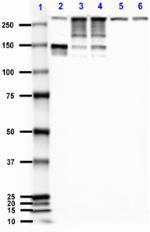
Western blot of anti-Alpha-II Spectrin antibody (clone D8B7)... 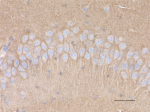
IHC staining of anti-Alpha-II Spectrin antibody (clone D8B7)... 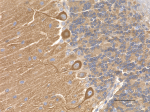
IHC staining of anti-Alpha-II Spectrin antibody (clone D8B7)... 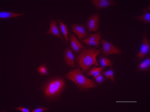
ICC staining of anti-Alpha-II Spectrin antibody (clone D8B7)... 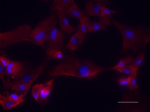
ICC staining of anti-Alpha-II Spectrin antibody (clone D8B7)... -
Purified anti-Alpha-II Spectrin
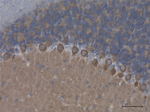
IHC staining of purified anti-Alpha-II Spectrin antibody (cl... 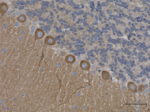
IHC staining of purified anti-Alpha-II Spectrin antibody (cl... 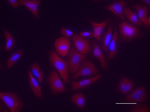
ICC staining of purified anti-Alpha-II Spectrin antibody (cl... 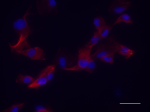
ICC staining of purified anti-Alpha-II Spectrin antibody (cl... 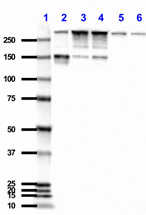
Western blot of purified anti-Alpha-II Spectrin antibody (cl... 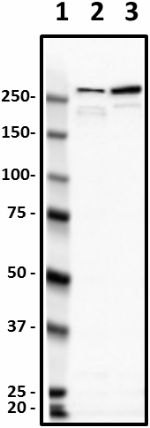
Western blot of purified anti-Alpha-II Spectrin antibody (cl... -
Biotin anti-Alpha-II Spectrin
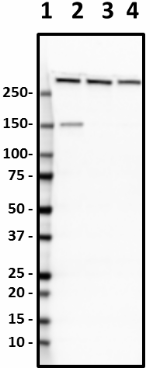
Western blot of Biotin anti-Alpha-II-Spectrin antibody (clon... 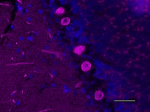
IHC staining of Biotin anti-Alpha-II-Spectrin antibody (clon... 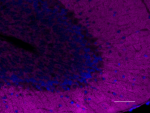
IHC staining of Biotin anti-Alpha-II-Spectrin antibody (clon... 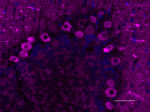
IHC staining of Biotin anti-Alpha-II-Spectrin antibody (clon...
 Login / Register
Login / Register 









Follow Us